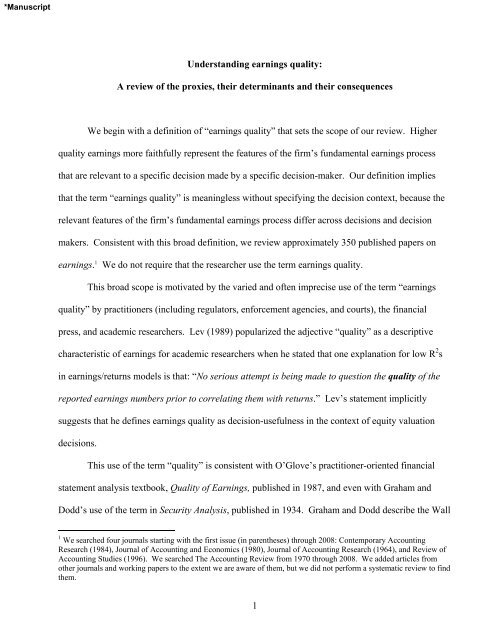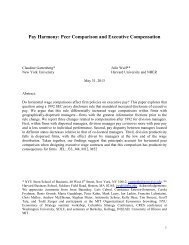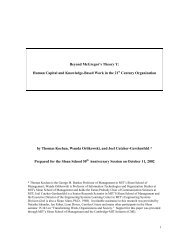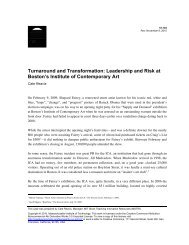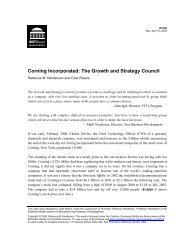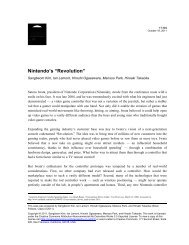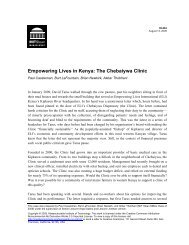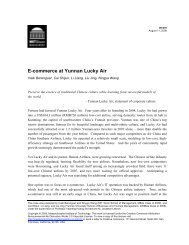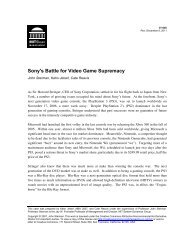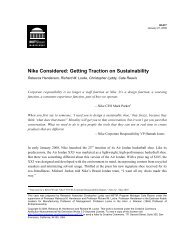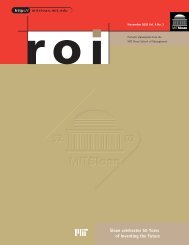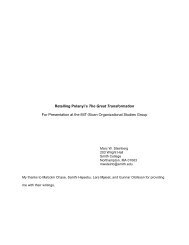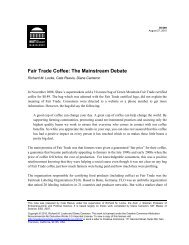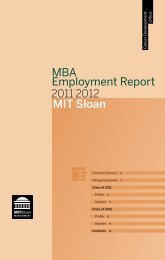Understanding earnings quality - MIT Sloan School of Management
Understanding earnings quality - MIT Sloan School of Management
Understanding earnings quality - MIT Sloan School of Management
Create successful ePaper yourself
Turn your PDF publications into a flip-book with our unique Google optimized e-Paper software.
*Manuscript<br />
<strong>Understanding</strong> <strong>earnings</strong> <strong>quality</strong>:<br />
A review <strong>of</strong> the proxies, their determinants and their consequences<br />
We begin with a definition <strong>of</strong> “<strong>earnings</strong> <strong>quality</strong>” that sets the scope <strong>of</strong> our review. Higher<br />
<strong>quality</strong> <strong>earnings</strong> more faithfully represent the features <strong>of</strong> the firm’s fundamental <strong>earnings</strong> process<br />
that are relevant to a specific decision made by a specific decision-maker. Our definition implies<br />
that the term “<strong>earnings</strong> <strong>quality</strong>” is meaningless without specifying the decision context, because the<br />
relevant features <strong>of</strong> the firm’s fundamental <strong>earnings</strong> process differ across decisions and decision<br />
makers. Consistent with this broad definition, we review approximately 350 published papers on<br />
<strong>earnings</strong>. 1 We do not require that the researcher use the term <strong>earnings</strong> <strong>quality</strong>.<br />
This broad scope is motivated by the varied and <strong>of</strong>ten imprecise use <strong>of</strong> the term “<strong>earnings</strong><br />
<strong>quality</strong>” by practitioners (including regulators, enforcement agencies, and courts), the financial<br />
press, and academic researchers. Lev (1989) popularized the adjective “<strong>quality</strong>” as a descriptive<br />
characteristic <strong>of</strong> <strong>earnings</strong> for academic researchers when he stated that one explanation for low R 2 s<br />
in <strong>earnings</strong>/returns models is that: “No serious attempt is being made to question the <strong>quality</strong> <strong>of</strong> the<br />
reported <strong>earnings</strong> numbers prior to correlating them with returns.” Lev’s statement implicitly<br />
suggests that he defines <strong>earnings</strong> <strong>quality</strong> as decision-usefulness in the context <strong>of</strong> equity valuation<br />
decisions.<br />
This use <strong>of</strong> the term “<strong>quality</strong>” is consistent with O’Glove’s practitioner-oriented financial<br />
statement analysis textbook, Quality <strong>of</strong> Earnings, published in 1987, and even with Graham and<br />
Dodd’s use <strong>of</strong> the term in Security Analysis, published in 1934. Graham and Dodd describe the Wall<br />
1 We searched four journals starting with the first issue (in parentheses) through 2008: Contemporary Accounting<br />
Research (1984), Journal <strong>of</strong> Accounting and Economics (1980), Journal <strong>of</strong> Accounting Research (1964), and Review <strong>of</strong><br />
Accounting Studies (1996). We searched The Accounting Review from 1970 through 2008. We added articles from<br />
other journals and working papers to the extent we are aware <strong>of</strong> them, but we did not perform a systematic review to find<br />
them.<br />
1


